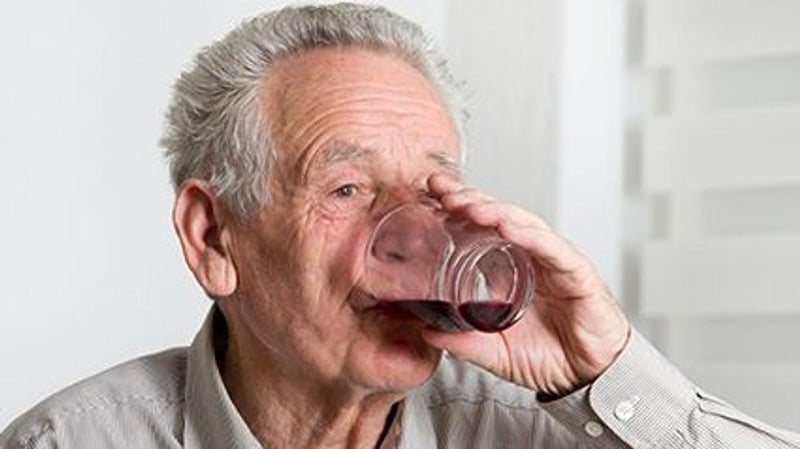Get Healthy!

- Posted August 31, 2021
'Holiday Heart': When Drinking Triggers Dangerous A-fib
With Labor Day festivities approaching, you might want to think twice about that cocktail. Or at least you should avoid that second round, especially if you have a history of your heart beating irregularly.
A new study appears to confirm the existence of "holiday heart syndrome" -- a higher risk of atrial fibrillation (a-fib), after even moderate drinking.
While past studies have suggested that drinking more alcohol over the long-term was associated with a higher risk of developing a-fib, it has been hard to prove it in a real-world setting.
Modern technology has changed that, said study co-author Dr. Gregory Marcus, an associate chief of cardiology for research at the University of California, San Francisco.
Marcus and his colleagues outfitted study volunteers with wearable alcohol sensors to see if consuming alcohol would have a heightened risk of an atrial fibrillation event.
"We know that atrial fibrillation is the most common arrhythmia and we know that it can come and go on its own, but the reason a particular episode occurs when it occurs remains largely a mystery," Marcus said. "We generally attribute the fact that an atrial fibrillation episode happened at 2 o'clock on a Tuesday, instead of 3 o'clock on a Wednesday, to just bad luck or pure chance."
"So a question is whether there are identifiable and measurable environmental exposures that might actually influence the risk that a discrete episode will occur. And more clinically relevant, the question is whether there are behaviors or exposures that are directly under the control of the patient that can influence the chance an atrial fibrillation episode will occur," Marcus said.
The answer, in a word: yes.
The 100 study participants all had experienced atrial fibrillation in the past. They wore a continuous electrocardiogram (ECG) monitor during the four-week study period, as well as an ankle-worn transdermal ethanol sensor. They documented each drink consumed by hitting a button on their ECG. They also used fingerstick blood tests to confirm their drinking.
During the study, 56 participants had at least one episode of atrial fibrillation. The episodes were associated with two-fold higher odds of one alcohol drink and three-fold higher odds of two drinks in the four hours before.
What is A-fib?
Sometimes referred to as the "holiday heart syndrome" because of its connection to weekend and holiday drinking, atrial fibrillation is quivering or irregular heartbeat that affects at least 2.7 million people in the United States, according to the American Heart Association.
It can lead to blood clots, strokes, heart failure and other heart complications, the AHA said. The condition could affect 12 million people by 2050, the study estimates.
This study was limited to only those who already had a diagnosis of atrial fibrillation, so by definition, they are at the highest risk of experiencing an episode, Marcus said.
"It does suggest that minimizing, if not completely abstaining from alcohol, is probably a wise choice to try and minimize the risk of a recurrent atrial fibrillation episode" for these patients, Marcus said.
Whether that also applies to those who are at high risk for atrial fibrillation but don't have a diagnosis is unclear, Marcus said. This could vary from person to person.
"One finding that is very clear from this study and others is that heavy drinking is clearly harmful," Marcus said. "We were unable to identify a clear threshold of drinking that heightened a-fib risk. It appeared that the more alcohol that was consumed, the more that risk rose. So, for the general population, I think the conservative interpretation is to say, this is yet more evidence that one should avoid heavy drinking."
Exactly how alcohol impacts the electrical properties of the heart deserves more research, Marcus said.
The study was published Aug. 30 in the Annals of Internal Medicine.
Monitor your drinking
The takeaway for people who are diagnosed with atrial fibrillation is they really need to monitor and be very aware of what they're drinking, said Mariann Piano, senior associate dean for research at Vanderbilt University School of Nursing's Center for Research Development and Scholarship in Nashville. Piano also wrote an editorial published with the study.
"Often we go out and we have dinner with friends and we don't always track how much alcohol that we have consumed. We have to teach patients what are modifiable behaviors in terms of their condition," Piano said. "I think for me, a big takeaway as health care providers, we really need to be educating our patients and stating, 'Look, this could be a risk factor'."
Other studies have shown even if you don't have atrial fibrillation, regular consumption of alcohol increases your risk for atrial fibrillation, Piano said. And for patients with occasional atrial fibrillation, drinking has increased their risk of developing persistent A-fib, Piano added.
In her editorial, Piano noted that the study also measured phosphatidyl-ethanol (PEth), which is formed when alcohol has been consumed. It has a half-life of four to 10 days and indicates regular moderate to heavy alcohol use. The PEth levels in the study suggest more than half of the participants were regular drinkers, Piano said.
Piano said she would be interested in a follow-up study that only included patients who were PEth-negative.
"There were a lot of technical aspects to the study that I think contributes to the strength of its design and then of course the results and recommendations," Piano said. "So I think it definitely moves us forward in understanding the relationship between alcohol and associated atrial fibrillation."
More information
The American Heart Association describes warning signs of a-fib.
SOURCES: Gregory Marcus, MD, associate chief, cardiology for research, University of California, San Francisco; Mariann Piano, PhD, senior associate dean for research, Center for Research Development and Scholarship, Vanderbilt University School of Nursing, Nashville, Tenn.; Annals of Internal Medicine, Aug. 30, 2021






